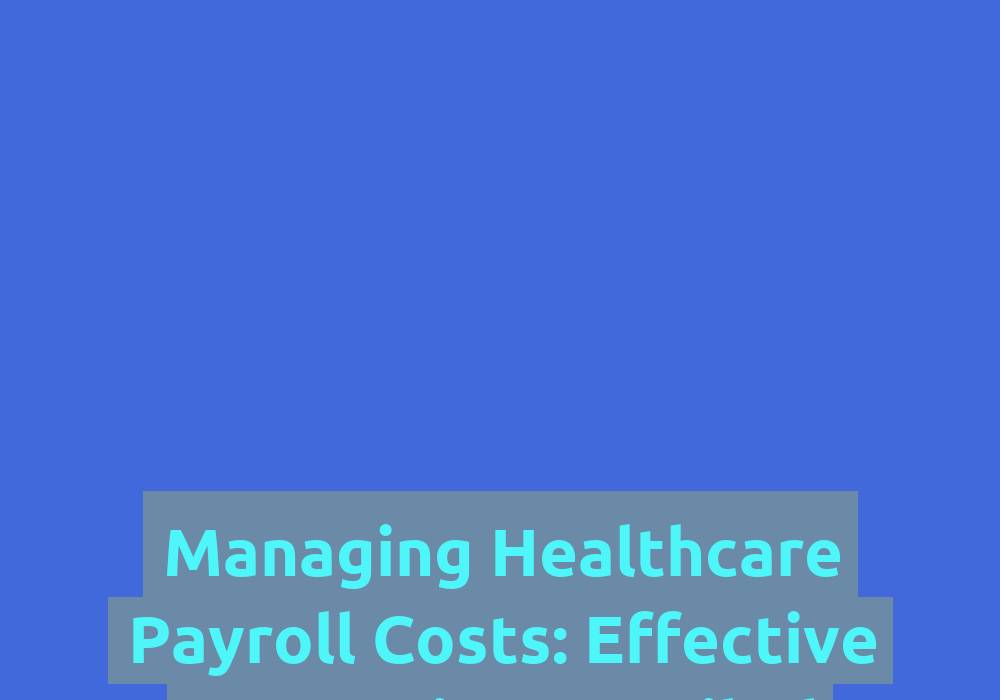Enhance Efficiency in Administrative Operations
Optimising administrative operations is crucial for effectively reducing healthcare business expenses. Healthcare facilities such as hospitals and clinics frequently grapple with overwhelming paperwork, inefficient processes, and legacy systems that hinder productivity. By refining these critical areas, healthcare providers can achieve substantial cost reductions while simultaneously enhancing patient care and increasing clinician satisfaction. Administrative inefficiencies can lead to significant resource waste; thus, investing in the improvement of these processes is essential for sustainable operations and delivering quality healthcare services.
Adopt Comprehensive Electronic Health Records (EHRs)
Making the transition to Electronic Health Records (EHRs) stands out as one of the most effective strategies for alleviating the administrative strain in healthcare environments. EHRs consolidate patient information, increase accessibility, and diminish the dependency on paper documentation. This transformation not only boosts data accuracy but also fosters better care coordination among healthcare professionals. In the UK, the National Health Service (NHS) has been championing the digital overhaul of patient records, and numerous practices report significant reductions in paperwork alongside enhanced patient interactions as a direct outcome.
The introduction of EHRs can result in remarkable time savings for healthcare personnel. For example, nurses and administrative teams spend considerably less time on documentation, allowing them to devote more attention to patient care. Furthermore, EHRs assist in meeting legal and regulatory mandates, thereby mitigating the risk of incurring expensive fines or facing litigation due to data mismanagement or breaches of privacy. When exploring ways to cut down healthcare business expenses, the financial advantages stemming from fewer administrative blunders and a more efficient patient data management system are significant and cannot be disregarded.
With the emergence of cloud-based EHR solutions, healthcare organisations also benefit from reduced initial costs and the adaptability to expand as required. Case studies from practices that have embraced EHR systems illustrate improvements in patient outcomes and overall satisfaction, as appointment management becomes more streamlined, leading to better resource utilisation.
Streamline Billing and Coding through Automation
The automation of billing and coding procedures serves as a powerful mechanism in the effort to reduce healthcare business expenses. Traditional manual billing and coding processes are often laborious and susceptible to mistakes, which can result in delayed payments and heightened administrative expenditures. Automation software not only accelerates these procedures but also significantly diminishes the risk of human error—an indispensable aspect of maintaining robust cash flow and guaranteeing prompt reimbursements.
Automated systems can seamlessly integrate with EHRs, forming a unified ecosystem that monitors patient visits, treatments, and billing within a single platform. This integration enhances overall workflow efficiency and offers greater transparency into the revenue cycle. Moreover, automated billing systems can pinpoint discrepancies or billing problems before they become significant issues, enabling healthcare providers to rectify them quickly. Consequently, practices can anticipate faster payment cycles and a decrease in administrative burdens.
By opting to automate these crucial functions, healthcare organisations across the UK can also reallocate financial resources toward essential services that directly improve patient care. The long-term financial benefits achieved through automation can be substantial, presenting a clear pathway for minimising overall operational costs.
Strategically Outsource Non-Core Functions
Outsourcing non-core functions such as payroll, IT support, and specific elements of patient engagement is an effective tactic for healthcare providers aiming to reduce healthcare business expenses. By entrusting these tasks to specialised firms, healthcare organisations can concentrate their resources on core services that directly impact patient care. This strategic redistribution of resources not only lowers overhead costs but also enhances the quality of services provided.
For instance, outsourcing IT support allows access to cutting-edge technology without necessitating substantial investments in infrastructure and ongoing maintenance. Numerous firms offer extensive services that encompass everything from data security to software upgrades, ensuring healthcare providers remain compliant with regulatory standards without grappling with the intricacies of technology management.
Additionally, delegating payroll functions to third-party providers can streamline processes and minimise errors related to payroll discrepancies. This effectively liberates administrative personnel to focus on patient-facing responsibilities, thereby boosting overall productivity. By leveraging outsourcing, healthcare providers can establish a more agile business model that adapts to evolving patient needs while efficiently managing expenses.
Maximise Staffing Efficiency and Workforce Management
Optimising workforce management is vital for curtailing costs while upholding high standards of patient care. Understanding patient demand and adjusting workforce levels accordingly can lead to substantial savings in labour costs, especially during periods of fluctuating patient volumes. The management of staffing resources necessitates strategic planning and adaptable approaches, ensuring that healthcare organisations can respond effectively to patient requirements.
Embrace Flexible Staffing Models
Flexible staffing models empower healthcare providers to adjust their workforce in alignment with shifting patient demands. By employing part-time staff or temporary workers during peak periods, such as flu season or local health emergencies, organisations can adeptly manage labour costs while guaranteeing sufficient coverage. This method alleviates the financial strain associated with retaining full-time employees during lulls in patient volume.
In the UK, a multitude of healthcare facilities have embraced a combination of full-time and part-time staff, creating a dynamic workforce capable of adapting to patient needs while minimising unnecessary overtime expenditures. Leveraging data analytics allows organisations to forecast patient influx trends and optimise staffing accordingly. This not only enhances operational effectiveness but also improves staff morale, as employees experience less burnout due to overwork.
Moreover, flexible staffing helps to mitigate some challenges faced by healthcare providers when seeking specialised roles. By maintaining a pool of qualified part-time professionals, organisations can swiftly fill vacancies without the delays typically associated with traditional hiring processes. This proactive approach to workforce management significantly contributes to reducing healthcare business expenses while simultaneously improving service delivery.
Prioritise Staff Training and Development
Investing in staff training and development represents a critical component of optimising workforce management in healthcare. Well-trained personnel can function more efficiently, leading to enhanced patient care and fewer errors, which are often costly. Through comprehensive training programmes, healthcare organisations can ensure their teams are equipped with the most up-to-date knowledge and skills, ultimately boosting operational effectiveness.
For instance, training staff on new technologies, such as EHR systems or telemedicine platforms, can drastically lessen the learning curve and improve adoption rates. This, in turn, fosters a culture of continuous improvement and innovation within the organisation. Training that emphasises best practices in patient care and safety can result in fewer incidents and complications, consequently lowering costs linked to medical errors.
Furthermore, ongoing professional development opportunities can elevate employee morale and retention, reducing turnover rates. When staff feel appreciated and perceive opportunities for advancement, they are more likely to remain loyal to their organisation. This loyalty translates into a more experienced workforce, which can further enhance the quality of patient care and diminish the costs associated with frequent recruitment and training of new hires.
Leverage Telemedicine and Remote Work Solutions
Telemedicine has emerged as a revolutionary force in the healthcare sector, particularly in the aftermath of the COVID-19 pandemic. By facilitating virtual consultations, healthcare providers can drastically reduce the necessity for physical office space and the related overhead costs. This not only results in savings on utilities and maintenance but also enables a more flexible staffing approach.
Remote work options for administrative roles can further amplify cost savings. Employees working from home typically incur lower overhead costs, and organisations can broaden their talent pool to include remote workers from diverse locations within the UK. This flexibility can enhance job satisfaction and productivity, as staff benefit from a healthier work-life balance.
Moreover, telemedicine can optimise patient interactions, with studies indicating that patients value the convenience of virtual appointments. This increased patient satisfaction can lead to higher retention rates, further bolstering the financial health of the organisation. As healthcare providers progressively embrace digital solutions, telemedicine emerges as a pivotal strategy in reducing healthcare business expenses while enhancing access to care.
Enhance Workforce Scheduling Systems for Efficiency
Advanced workforce scheduling systems can significantly enhance staff allocation within healthcare environments. These systems employ data analytics to forecast patient volume and optimise staff schedules accordingly. By ensuring that an appropriate number of staff are present during peak periods, organisations can evade the costly repercussions of both overstaffing and understaffing.
In the UK, numerous hospitals and clinics are now implementing sophisticated scheduling software that integrates seamlessly with existing systems. This not only promotes more effective resource utilisation but also fosters staff engagement, as employees can have input into their schedules. The outcome is a more agile workforce capable of responding to fluctuating patient requirements without incurring excessive overtime costs.
Additionally, enhanced scheduling solutions can facilitate efficient communication within teams, allowing for swift adjustments as necessary. For instance, if there is a sudden surge in patient numbers, the system can quickly identify available personnel and notify them to come in. This agility is an essential aspect of reducing healthcare business expenses, ensuring that resources are managed effectively while maintaining high-quality care.
Implement Employee Retention Strategies
Retention strategies are crucial in minimising turnover rates within healthcare settings. High turnover can incur substantial costs related to recruitment, onboarding, and training new employees. By cultivating a positive work environment and implementing impactful retention programmes, healthcare organisations can maintain a stable and experienced workforce.
In the UK, initiatives like mentorship programmes, professional development opportunities, and health and wellness initiatives can significantly enhance employee satisfaction. By providing support and resources to staff, organisations can nurture a culture of loyalty and commitment. Programs that acknowledge and reward employee achievements can further improve job satisfaction and decrease turnover rates.
Moreover, understanding the specific needs and preferences of staff can help organisations tailor their retention strategies. Conducting regular feedback sessions and employee surveys can yield valuable insights into areas that require improvement. When employees feel valued and heard, they are more likely to remain with the organisation, ultimately contributing to a reduction in overall operational costs associated with high turnover rates and the continuous need for recruitment.
Minimise Supply and Equipment Expenditures
Effectively managing supply and equipment costs is another critical area where healthcare organisations can realise substantial savings. By adopting strategic purchasing practices and implementing efficient inventory management systems, providers can lower expenditures without compromising the quality of care delivered.
Negotiate Bulk Purchasing Agreements for Cost Efficiency
Negotiating bulk purchasing agreements stands out as one of the most effective methods for decreasing supply costs in healthcare. By collaborating with suppliers and strategically planning purchases, organisations can leverage economies of scale, resulting in lower per-unit costs for medical supplies and equipment. This is particularly vital in an environment where budgets are consistently under pressure.
Healthcare organisations in the UK can harness group purchasing organisations (GPOs) to amplify their negotiating power. By uniting with other healthcare providers, smaller clinics can access pricing and agreements that are typically reserved for larger hospitals. This collaborative approach not only fosters community among healthcare providers but also unlocks substantial cost savings on essential supplies.
Beyond cost reductions, bulk purchasing agreements can enhance supply chain reliability. When organisations commit to larger orders, suppliers can more accurately predict demand and ensure that essential stock is readily available when needed. This reliability is essential for maintaining uninterrupted patient care, further solidifying the impact of bulk purchasing on reducing healthcare business expenses.
Implement Advanced Inventory Management Systems
Effective inventory management systems serve as a cornerstone for cost control in healthcare organisations. By employing advanced software to monitor the usage of supplies and equipment, providers can significantly minimise waste and guarantee that resources are used efficiently. This proactive approach not only mitigates costs associated with overstocking but also ensures that critical supplies are accessible when necessary.
In the UK, many hospitals have adopted automated inventory management systems that deliver real-time data on supply levels. By analysing usage patterns and forecasting future demands, these systems can alert staff when stock is dwindling, preventing last-minute purchases at inflated prices. Moreover, proper inventory management can aid healthcare providers in reducing waste from expired items, further contributing to cost savings.
Implementing a just-in-time inventory model can also prove beneficial, ensuring that supplies arrive precisely when required rather than accumulating excessive stock. This approach necessitates careful coordination with suppliers but can lead to significant reductions in carrying costs and storage expenses. Overall, effective inventory management is a vital strategy in reducing healthcare business expenses while upholding a high standard of care.
Explore Equipment Leasing Options
Leasing medical equipment instead of purchasing it outright can offer substantial financial benefits for healthcare organisations. This strategy allows providers to access the latest technologies without the considerable upfront costs associated with buying equipment, making it an attractive option for many within the industry.
In the UK, leasing arrangements can provide necessary flexibility, enabling healthcare organisations to upgrade equipment as technology evolves without the burden of obsolescence. This adaptability is especially crucial in a rapidly changing healthcare landscape, where new technologies can improve patient care and operational efficiency.
Additionally, leasing can enhance cash flow management by distributing costs over time. This approach allows organisations to allocate financial resources to other essential areas, such as staffing or patient care initiatives. When assessing how to reduce healthcare business expenses, considering equipment leasing as a viable strategy can lead to improved financial stability and operational agility.
Enhance Energy Efficiency for Cost Reduction
Energy efficiency holds a pivotal role in reducing operational costs within healthcare organisations. By implementing energy-saving strategies, facilities can significantly lower their utility expenses, allowing funds to be redirected towards patient care and service enhancement.
Switch to Energy-Efficient Lighting Solutions
Transitioning to energy-efficient lighting systems, such as LED lights, can yield remarkable savings on electricity costs over time. These advanced lighting options consume considerably less energy than conventional incandescent or fluorescent lights and boast a longer lifespan, reducing replacement frequency and associated maintenance costs.
In the UK, numerous hospitals and clinics have already adopted LED lighting, resulting in substantial decreases in energy consumption. Although the initial investment may be higher, the long-term savings on energy bills and the reduced carbon footprint make it a wise choice. Furthermore, improved lighting quality can enhance the patient experience, creating a more welcoming and comfortable environment.
Government initiatives aimed at promoting energy efficiency in the healthcare sector can provide additional incentives for such upgrades, offering grants or financing options to assist with the transition. By prioritising energy-efficient lighting, healthcare organisations can enhance their financial performance while contributing to broader sustainability efforts within the community.
Install Intelligent Thermostats for Energy Management
Smart thermostats represent a significant advancement in energy management for healthcare facilities. These devices optimise heating and cooling systems, ensuring that energy is utilised efficiently. By accurately measuring occupancy levels and adjusting settings accordingly, smart thermostats can lead to substantial savings on energy bills.
In the UK, healthcare providers are increasingly recognising the advantages of smart technology. By integrating these systems with existing heating and cooling infrastructures, organisations can maintain comfortable environments for patients and staff while minimising energy waste. This not only results in lower utility costs but also contributes to more sustainable operations.
Additionally, smart thermostats can furnish valuable data regarding energy usage patterns, enabling healthcare organisations to pinpoint areas for further optimisation. By leveraging this information to inform energy-saving initiatives, facilities can continue to enhance their efficiency and reduce costs, demonstrating a proactive approach to reducing healthcare business expenses.
Implement Practical Energy-Saving Practices
In addition to technological upgrades, adopting simple energy-saving practices can lead to considerable savings for healthcare organisations. Encouraging staff to switch off equipment and lights when not in use can significantly cut down energy consumption, fostering a culture of awareness surrounding energy efficiency.
Healthcare facilities can also conduct energy audits to identify inefficiencies and implement tailored solutions. These audits can highlight areas where energy is being wasted and provide actionable recommendations for improvement. By engaging staff in energy-saving initiatives, organisations can cultivate a sense of responsibility and ownership over their energy consumption.
Educating staff about the importance of energy efficiency and its financial implications can further bolster participation in energy-saving practices. By fostering a culture of sustainability, healthcare organisations can enhance their financial performance while positively impacting the environment.
Invest in Energy-Efficient Appliances
Upgrading to energy-efficient appliances is another effective strategy for minimising utility costs in healthcare settings. Older appliances often consume more energy than necessary, resulting in inflated electricity bills. By investing in modern, energy-efficient models, organisations can reduce their energy usage and realise significant savings over time.
In the UK, healthcare providers can take advantage of various incentives that support the adoption of energy-efficient appliances, including government grants and financing options. These initiatives can help offset initial investment costs and encourage the transition to more sustainable equipment.
Beyond financial savings, using energy-efficient appliances can also enhance the overall quality of care. For instance, energy-efficient refrigeration systems can maintain optimal temperatures for medications and supplies, ensuring their effectiveness and safety. By prioritising energy efficiency, healthcare organisations can achieve dual benefits: operational cost savings and improved patient care quality.
Utilise Technology for Economic Benefits
The integration of technology has the potential to revolutionise healthcare operations, providing numerous opportunities for cost reduction. By embracing innovative solutions, healthcare organisations can streamline processes, enhance patient engagement, and improve care delivery.
Utilise Cloud-Based Solutions for Efficiency
Cloud-based solutions serve as a powerful tool for healthcare organisations seeking to optimise operations and reduce costs. By storing data in the cloud, providers can decrease their reliance on costly on-site servers and IT infrastructure. This not only cuts costs associated with hardware and maintenance but also improves data accessibility and collaboration among staff.
In the UK, many healthcare providers have successfully transitioned to cloud-based systems, benefiting from increased efficiency and reduced costs. These solutions enable healthcare teams to access patient records and collaborate in real-time, regardless of their location. This flexibility can be especially valuable in emergency situations, where timely access to information can significantly influence patient outcomes.
Moreover, cloud-based systems often come equipped with robust security features, minimising the risks associated with data breaches and assisting organisations in remaining compliant with regulatory requirements. Overall, leveraging cloud technology is a strategic move for healthcare providers aiming to reduce healthcare business expenses while enhancing operational efficiency.
Integrate AI and Machine Learning Technologies
Artificial intelligence (AI) and machine learning are transforming the healthcare landscape. These technologies can analyse extensive data sets to predict patient needs, optimise scheduling, and even identify potential health risks before they escalate. By incorporating AI-driven solutions, healthcare organisations can reduce unnecessary treatments and streamline care delivery.
In the UK, AI applications are being employed in diverse ways, from predicting patient admission rates to automating routine administrative tasks. By harnessing these insights, organisations can better allocate resources and improve patient care. For instance, AI can identify patients at risk of hospital readmission, allowing healthcare providers to implement targeted interventions that can prevent costly complications.
Furthermore, AI-driven tools can enhance decision-making capabilities among healthcare professionals. By offering evidence-based recommendations, these solutions can support clinicians in their daily practice, ultimately leading to improved patient outcomes and reduced operational costs.
Adopt Mobile Health Applications
Mobile health applications are transforming how patients interact with healthcare services. These applications enable patients to manage their health, schedule appointments, and access medical information from anywhere, significantly decreasing the necessity for in-person consultations. By embracing mobile health solutions, healthcare organisations can substantially alleviate administrative burdens and enhance patient satisfaction.
In the UK, a variety of mobile health applications are being developed to improve access to care and streamline communication between patients and providers. These applications empower patients to take control of their health, fostering better adherence to treatment plans and reducing hospital visits.
For healthcare organisations, mobile apps can also facilitate more efficient triage processes, enabling patients to receive timely care while minimising unnecessary visits. This can result in significant cost savings and improved resource allocation, aligning with the objective of reducing healthcare business expenses.
Emphasise Preventive Care for Long-Term Savings
Preventive care is a fundamental element of effective healthcare systems. By prioritising early intervention and wellness initiatives, healthcare organisations can diminish long-term treatment costs while improving patient outcomes.
Implement Comprehensive Health and Wellness Programs
Establishing health and wellness programmes can profoundly affect the long-term financial health of healthcare organisations. These initiatives encourage patients to embrace healthier lifestyles, ultimately decreasing the prevalence of chronic conditions that contribute to high treatment costs.
In the UK, a variety of healthcare providers are offering wellness programmes that focus on nutrition, exercise, and mental health. By providing resources and support, organisations can empower patients to adopt positive changes that lead to better health outcomes. This not only enhances patients’ quality of life but also alleviates the financial burden on the healthcare system.
Moreover, health and wellness programmes can foster a sense of community among patients, promoting social support and engagement. This sense of belonging can enhance adherence to treatment plans and preventive measures, further contributing to a decrease in healthcare costs.
Advocate for Vaccination Campaigns
Vaccination campaigns are a critical component of public health that can prevent outbreaks of preventable diseases. By advocating for vaccines, healthcare organisations can reduce the incidence of illnesses that require expensive emergency care and hospitalisation.
In the UK, vaccination efforts have demonstrated significant success in curtailing the spread of diseases such as influenza and measles. By investing in public health education and accessible vaccination services, healthcare providers can help safeguard communities while alleviating the financial strain on the healthcare system.
Additionally, vaccination campaigns can enhance patient engagement by encouraging individuals to actively participate in their health management. This proactive approach to health can yield long-term savings and improved health outcomes, supporting the broader goal of reducing healthcare business expenses.
Encourage Regular Health Screenings for Early Detection
Regular health screenings are paramount for the early detection of conditions that can become costly if left untreated. By encouraging patients to participate in screenings, healthcare organisations can identify health issues at an early stage, leading to more manageable treatments and better outcomes.
In the UK, primary care providers are increasingly offering comprehensive screening programmes that target high-risk populations. These initiatives not only enhance patient care but also contribute to long-term cost savings by preventing the progression of diseases that may require expensive interventions.
Furthermore, promoting regular health screenings can encourage patients to engage more actively with their healthcare providers. By nurturing this relationship, organisations can enhance patient loyalty and retention, contributing to a more stable revenue base.
Streamline Insurance and Claims Management
Effective management of insurance contracts and claims is crucial for maintaining financial health within healthcare organisations. By optimising these processes, providers can improve cash flow and reduce administrative costs associated with billing and claims processing.
Enhance Negotiations for Insurance Contracts
Negotiating improved terms with insurance providers can significantly affect a healthcare organisation’s financial performance. Better contract terms can lead to higher reimbursements and lower out-of-pocket costs for patients, ultimately boosting patient satisfaction and loyalty.
In the UK, healthcare organisations can benefit from leveraging data analytics to inform their negotiation strategies. By understanding their patient demographics and utilisation patterns, providers can negotiate more effectively with insurers, ensuring that their needs are adequately met.
Moreover, regularly reviewing and renegotiating contracts can help organisations remain competitive in a rapidly evolving healthcare landscape. By prioritising optimal contract terms, providers can substantially enhance their financial sustainability and contribute to reducing healthcare business expenses.
Implement Efficient Claims Management Software
Efficient claims management is essential for maintaining cash flow and minimising administrative costs. Adopting claims management software can streamline the claims process, decreasing the likelihood of denials and expediting payments from insurers.
In the UK, many healthcare organisations have implemented claims management solutions that integrate seamlessly with existing billing systems. These tools can automate claims submissions, track payment statuses, and identify discrepancies, enabling staff to proactively address issues.
The result is a more effective revenue cycle that enhances cash flow and diminishes the administrative burden on personnel. By concentrating on efficient claims management, healthcare organisations can realise significant savings while ensuring they receive appropriate compensation for the services rendered.
Frequently Asked Questions
What are the most effective strategies for minimising healthcare business expenses?
Implementing electronic health records, automating billing processes, and optimising staffing are essential strategies for reducing healthcare business expenses.
How can telemedicine contribute to cost reduction in healthcare?
Telemedicine decreases the necessity for physical office space and travel expenses, enabling healthcare providers to save on operational costs while enhancing accessibility for patients.
What role does employee training play in reducing costs?
Investing in employee training boosts efficiency and lowers errors, which can decrease costs related to rework while improving patient care.
How can bulk purchasing agreements lead to cost savings?
Bulk purchasing agreements allow healthcare organisations to negotiate lower prices for supplies by committing to larger orders, resulting in decreased per-unit costs.
Why is energy efficiency critical for healthcare facilities?
Enhancing energy efficiency lowers utility expenses and supports sustainability initiatives, permitting funds to be redirected towards patient care and services.
What are the advantages of using cloud-based solutions in healthcare?
Cloud-based solutions reduce IT infrastructure costs, improve data accessibility, and boost collaboration among healthcare teams, contributing to operational efficiency.
How does preventive care help in lowering long-term healthcare costs?
Preventive care reduces the incidence of chronic conditions, leading to decreased treatment costs and improved patient outcomes over time.
What is the significance of effective claims management in healthcare?
Effective claims management ensures timely reimbursements and reduces administrative costs, thereby improving cash flow and financial stability for healthcare organisations.
How can outsourcing non-core functions benefit healthcare providers?
Outsourcing non-core functions enables providers to lower overhead costs and focus their resources on core services that enhance patient care.
What impact do health and wellness programmes have on healthcare expenses?
Health and wellness programmes promote healthier behaviours, reducing the prevalence of chronic conditions and consequently lowering long-term treatment costs for healthcare providers.
The post Reduce Healthcare Business Expenses: A Practical Guide appeared first on Healthcare Marketing Service.











